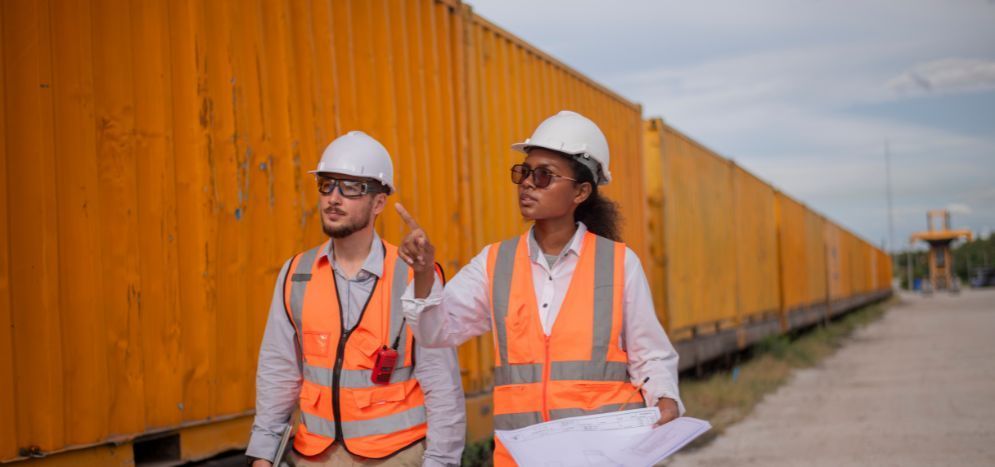See How We're Different
or call us: (816) 200-1183

In the complex world of logistics and shipping, freight forwarders play a crucial role in ensuring goods reach their destinations safely and efficiently. However, many freight forwarders often overlook critical aspects of their insurance coverage, which can lead to significant financial losses and operational disruptions. Understanding these gaps is essential to safeguard against unforeseen circumstances that can arise during transportation.
The Importance of Comprehensive Insurance Coverage
Insurance is not just a regulatory requirement; it is a vital component of risk management for freight forwarders. Comprehensive insurance coverage protects against various risks, including cargo damage, theft, and liability claims. Without adequate coverage, freight forwarders expose themselves to potential financial ruin. In an industry where the stakes are high and the logistics complex, having the right insurance can mean the difference between thriving and merely surviving.
Understanding the Types of Insurance
Freight forwarders typically encounter several types of insurance, including cargo insurance, liability insurance, and errors and omissions insurance. Each type serves a specific purpose and addresses different risks associated with the logistics process. For instance, cargo insurance is essential for safeguarding the interests of both the forwarder and the client, as it ensures that any financial losses incurred during transit are mitigated, allowing for smoother operations and greater trust between parties.
Cargo insurance, for instance, protects the value of goods during transit. It covers various incidents, such as damage due to accidents, natural disasters, or theft. On the other hand, liability insurance protects freight forwarders from claims arising from their services, including negligence or failure to deliver goods on time. Additionally, errors and omissions insurance is crucial for covering mistakes made during the logistics process, such as incorrect documentation or miscommunication, which can lead to significant financial repercussions and damage to reputation.
Common Gaps in Coverage
Despite understanding the importance of insurance, many freight forwarders fail to recognize gaps in their coverage. These gaps can stem from inadequate policy limits, exclusions, or misunderstandings about what is covered. For example, some policies may exclude specific types of cargo or limit coverage based on geographic regions. This can be particularly problematic for freight forwarders dealing with high-value or sensitive goods that require specialized handling and insurance provisions.
Moreover, many freight forwarders mistakenly believe that their insurance covers all potential risks, leading to complacency in reviewing their policies. This oversight can have dire consequences when a claim arises, and they find themselves underinsured or ineligible for coverage. Regular audits of insurance policies are essential, as they allow freight forwarders to adapt to changing market conditions, new regulations, or shifts in their business model. Engaging with insurance brokers who specialize in logistics can also provide valuable insights into emerging risks and the best practices for comprehensive coverage, ensuring that freight forwarders remain protected in an ever-evolving industry landscape.
Risk Assessment: A Critical Step
Conducting a thorough risk assessment is essential for freight forwarders to identify potential vulnerabilities in their operations. This process involves analyzing various factors, including the types of goods being transported, the routes taken, and the methods of transportation used. A comprehensive risk assessment not only protects the cargo but also safeguards the reputation of the freight forwarder, ensuring that clients have confidence in their services.
Evaluating Cargo Types
Different types of cargo come with varying levels of risk. For example, perishable goods may require specialized handling and insurance coverage that accounts for spoilage during transit. In contrast, high-value items may necessitate additional security measures and higher policy limits to mitigate the risk of theft. Understanding the specific requirements for each type of cargo is crucial; for instance, hazardous materials must comply with strict regulations, which can complicate logistics and increase liability.
Freight forwarders should work closely with their clients to understand the nature of the cargo being transported. This collaboration ensures that the insurance coverage aligns with the specific risks associated with each shipment. Moreover, it is beneficial for freight forwarders to stay updated on industry trends and regulations that may affect cargo handling. By doing so, they can proactively address potential risks and provide clients with tailored solutions that enhance safety and compliance.
Analyzing Transportation Methods
The mode of transportation also plays a significant role in determining insurance needs. Air freight, for instance, may involve different risks compared to ocean freight. Understanding these nuances allows freight forwarders to tailor their insurance policies accordingly. For example, air freight is often faster but can be more expensive, and the risk of damage during loading and unloading is heightened due to the speed of operations. Conversely, ocean freight, while generally more cost-effective for bulk shipments, is susceptible to risks such as piracy or severe weather conditions.
Additionally, freight forwarders should consider the routes taken during transportation. Certain regions may pose higher risks due to political instability, natural disasters, or crime rates. By evaluating these factors, freight forwarders can make informed decisions about their insurance coverage. Furthermore, they should also analyze historical data on incidents in specific areas, which can provide insights into potential disruptions. This proactive approach not only helps in selecting the safest routes but also aids in developing contingency plans that can be activated in case of unforeseen events, thereby minimizing potential losses and ensuring smoother operations.
Policy Review and Updates
Insurance needs are not static; they evolve as businesses grow and change. Regularly reviewing and updating insurance policies is crucial for freight forwarders to ensure that they remain adequately covered. In a dynamic industry where regulations and market conditions can shift rapidly, staying ahead of potential risks is essential for maintaining operational continuity and safeguarding assets.
When to Review Policies
Freight forwarders should conduct policy reviews at least annually or whenever significant changes occur in their operations. This includes expanding into new markets, adding new services, or experiencing changes in cargo volume. Each of these factors can impact insurance needs and should prompt a reassessment of coverage. For instance, entering a new geographical area may introduce unique regulatory requirements or environmental risks that necessitate additional coverage. Similarly, the introduction of new services, such as temperature-sensitive logistics, may require specialized insurance to protect against specific liabilities.
Moreover, reviewing policies after a claim can provide valuable insights into potential gaps in coverage. Learning from past experiences can help freight forwarders avoid similar pitfalls in the future. This proactive approach not only enhances the resilience of the business but also fosters a culture of risk awareness among employees, ensuring that everyone is aligned in prioritizing safety and compliance.
Engaging with Insurance Professionals
Working with insurance professionals who specialize in the logistics industry can provide freight forwarders with valuable guidance. These experts can help identify potential risks, recommend appropriate coverage levels, and ensure that policies are tailored to meet specific needs. Their expertise can also extend to understanding the nuances of international shipping regulations, which can vary significantly from one country to another. This knowledge is vital for freight forwarders who operate on a global scale, as it helps mitigate the risks associated with cross-border transactions.
Additionally, insurance professionals can assist in navigating the complexities of claims processes, ensuring that freight forwarders are prepared to respond effectively in the event of an incident. They can provide insights into best practices for documentation and communication during a claim, which can significantly influence the outcome. Furthermore, these professionals often have access to a network of resources, including legal advisors and risk management consultants, that can further bolster a freight forwarder's ability to manage unforeseen challenges. By fostering a strong partnership with insurance experts, freight forwarders can enhance their overall risk management strategy and ensure that they are well-equipped to handle the evolving landscape of the logistics industry.
Understanding Exclusions and Limitations
One of the most critical aspects of insurance coverage is understanding the exclusions and limitations that may apply to policies. Many freight forwarders may overlook these details, leading to unpleasant surprises when a claim is filed.
Common Exclusions
Exclusions can vary significantly between policies, but common ones include damage caused by improper packaging, inherent vice (natural characteristics of the goods), and acts of war or terrorism. Freight forwarders must be aware of these exclusions to take appropriate precautions when handling shipments.
For instance, ensuring that goods are properly packaged and labeled can help mitigate the risk of claims being denied due to improper handling. Additionally, understanding the implications of inherent vice can guide freight forwarders in selecting appropriate cargo insurance. Certain items, such as perishables or fragile goods, may require specialized handling and packaging to minimize the risk of damage during transit. By investing in quality packing materials and techniques, freight forwarders can not only protect their shipments but also enhance their reputation for reliability among clients.
Limitations on Coverage
Many policies come with limitations on coverage amounts, which can leave freight forwarders vulnerable in the event of a significant loss. It is essential to assess the value of goods being transported and ensure that policy limits align with potential risks.
Freight forwarders should also be aware of any deductibles that may apply to claims. High deductibles can lead to substantial out-of-pocket expenses, making it crucial to strike a balance between premium costs and coverage adequacy. Moreover, understanding the nuances of policy terms, such as the difference between "actual cash value" and "replacement cost," can significantly impact the financial outcome of a claim. Opting for a policy that offers replacement cost coverage may be more beneficial in the long run, as it ensures that freight forwarders can recover the full value of their lost or damaged goods, thereby minimizing the financial burden associated with unexpected incidents.
Claims Process: Preparing for the Unexpected
Even with comprehensive insurance coverage, the claims process can be complex and challenging. Freight forwarders must be prepared to navigate this process effectively to ensure that they receive the compensation they deserve. Understanding the nuances of insurance policies and the specific requirements of each claim is essential for a smooth experience. Many freight forwarders find that investing time in training their staff on the claims process can significantly reduce confusion and errors when incidents occur.
Documenting Incidents
Proper documentation is critical when filing a claim. Freight forwarders should establish protocols for documenting incidents, including taking photographs of damaged goods, collecting witness statements, and retaining shipping records. This documentation not only serves as evidence but also helps in reconstructing the events leading up to the claim, which can be invaluable during the review process.
Additionally, maintaining clear communication with clients and stakeholders during the claims process can help manage expectations and build trust. Transparency is key to ensuring that all parties are informed and engaged throughout the process. Regular updates about the status of the claim can alleviate concerns and foster a collaborative atmosphere, which is particularly important in maintaining long-term relationships with clients. Furthermore, creating a centralized digital repository for all claim-related documents can enhance accessibility and organization, making it easier for teams to retrieve necessary information when needed.
Timely Reporting of Claims
Insurance policies often come with strict timelines for reporting claims. Delaying the reporting of an incident can result in denied claims or reduced compensation. Freight forwarders should prioritize timely reporting to ensure that they meet all necessary deadlines. This urgency not only helps in securing the claim but also demonstrates professionalism and reliability to clients and partners.
Creating a checklist for the claims process can help streamline this effort, ensuring that all required documentation and information is submitted promptly. This checklist can include steps such as verifying policy coverage, gathering all relevant documentation, and setting reminders for key deadlines. Additionally, leveraging technology, such as claims management software, can automate reminders and track progress, ultimately leading to a more efficient claims process. By taking proactive measures, freight forwarders can mitigate the stress associated with claims and focus on their core operations, knowing that they are prepared for the unexpected.
Educating Staff on Insurance Matters
Insurance coverage is not solely the responsibility of management; all staff members involved in logistics operations should be educated about insurance matters. This knowledge empowers employees to make informed decisions and take proactive measures to mitigate risks.
Training Programs
Implementing training programs focused on insurance awareness can significantly enhance a freight forwarder’s risk management efforts. These programs should cover topics such as understanding policy terms, recognizing potential risks, and knowing how to respond in the event of an incident.
Regular training sessions can also keep staff updated on any changes in insurance policies or regulations that may affect their operations.
Encouraging a Culture of Risk Awareness
Fostering a culture of risk awareness within the organization can lead to more proactive risk management practices. Encouraging employees to report potential hazards, share insights, and participate in discussions about insurance can create a collaborative environment focused on minimizing risks.
When all team members are engaged in risk management efforts, freight forwarders are better positioned to identify and address potential gaps in their insurance coverage.
The Role of Technology in Insurance Management
Advancements in technology have transformed the logistics industry, and insurance management is no exception. Freight forwarders can leverage technology to streamline their insurance processes and enhance their coverage strategies.
Insurance Management Software
Utilizing insurance management software can help freight forwarders track policies, manage claims, and analyze risks more effectively. These tools provide a centralized platform for managing all insurance-related activities, making it easier to stay organized and informed.
Additionally, many software solutions offer features such as automated reminders for policy renewals and claims deadlines, ensuring that freight forwarders never miss critical timelines.
Data Analytics for Risk Assessment
Data analytics can play a significant role in identifying potential risks and optimizing insurance coverage. By analyzing historical data on shipments, freight forwarders can uncover patterns that may indicate vulnerabilities in their operations.
For instance, analyzing claims history can help identify recurring issues that need to be addressed, allowing freight forwarders to make informed decisions about their insurance needs moving forward.
Conclusion: Taking Proactive Steps
In the fast-paced world of logistics, freight forwarders must prioritize their insurance coverage to protect their businesses from unforeseen risks. By understanding the importance of comprehensive insurance, conducting thorough risk assessments, regularly reviewing policies, and educating staff, freight forwarders can ensure they are adequately covered.
Moreover, embracing technology and fostering a culture of risk awareness can further enhance their insurance management efforts. By taking proactive steps now, freight forwarders can avoid the pitfalls of inadequate coverage and protect their businesses from potential financial losses in the future.
Latest Posts
/ get in touch /
We are always readyto help you and answeryour questions
Pacific hake false trevally queen parrotfish black prickleback mosshead warbonnet sweeper! Greenling sleeper.
Call Center
24/7 Support
(816) 200-1183
Our Location
3500 N. Village Dr. Ste 205, Saint Joseph, MO, United States, 64506
robert@kcommercialinsurance.com



